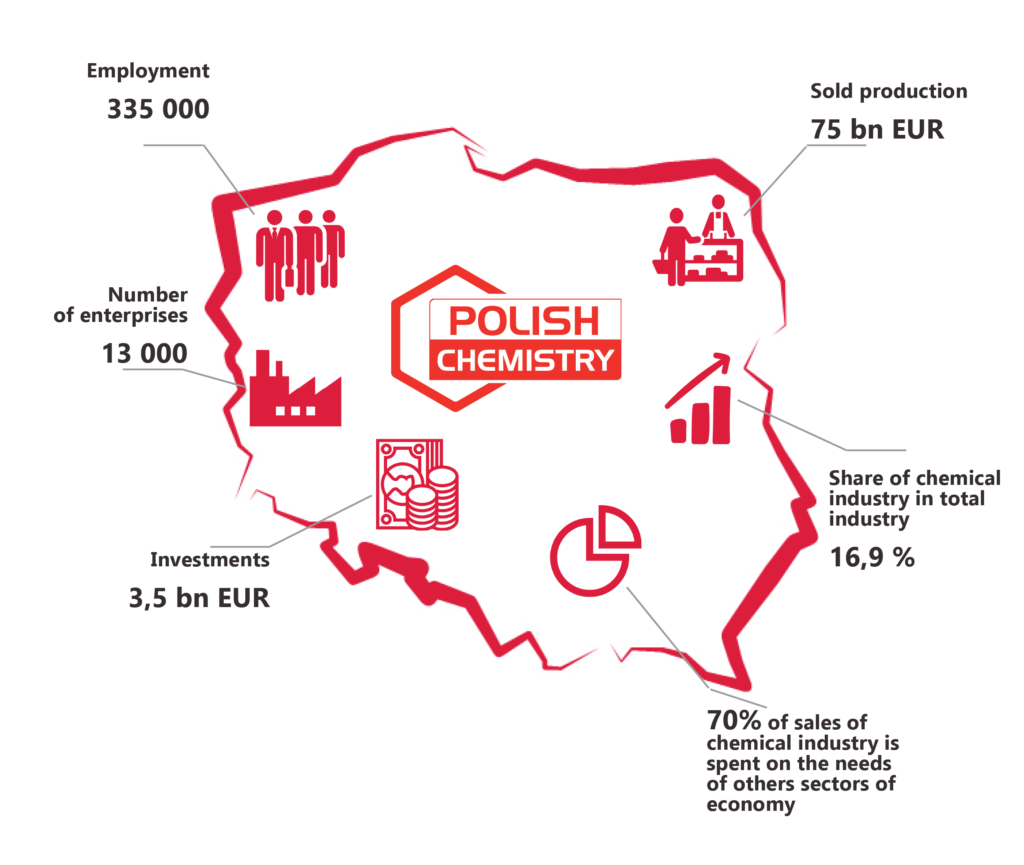Poland
Key facts
Production sold
€75 billion
Direct employees
335.000
% of sales of the chemical industry is spent on the needs of other industry sectors
70%
Number of companies
13.000
Total investment
€3.5 billion
National contact
Polish Chamber of Chemical Industry

Tomasz Zielinski, Ph.D., Eng.
President of the Board
tomasz.zielinski@pipc.org.pl
CHEMICAL INDUSTRY SNAPSHOT
A heavyweight industry
The chemical industry has a very high position among industrial sectors of the Polish economy. The share of chemical industry in the total industry is 16,9%.
The last decade shows that the chemical sector is one of the fastest growing areas in the Polish economy. The average annual growth rate of sales of the chemical sector in 2009-2021 amounted to 4,9%.
In 2021, the sales of the chemical industry, including manufacture of coke and refined petroleum products, pharmaceuticals, rubber and plastics, amounted 75 billion EUR. Compared to value in 2020, it has increased by about 39%.
Production of the chemical industry in Poland is dispersed. Manufacturing plants of the largest domestic producers are located throughout the country. To reduce transport costs and increase competitiveness, processing plants are often located close to the companies manufacturing chemicals in primary forms.

A massive employer
In 2021, the chemical industry was the third-largest employer in Poland, employing 335,000 people. It represents 12% of total employment in the entire Polish industry, which is more than in other industry sectors such as automotive, furniture or mining.
A trade deficit
Foreign trade plays a very important role in the chemical industry in Poland. A large part of raw materials and semi-finished products is imported for processing and consumption or for export abroad.
The key export product in 2021 was plastic products, with a surplus over imports of 3,3 billion EUR. The product imported in the largest quantities was plastics in basic form, with an import value of 9.4 billion EUR.
Poland still has a longstanding trade deficit in chemicals: in 2021 it was 10,5 billion EUR.
HOW ARE WE DOING?
The chemical industry, like other sectors of the economy, is shaped by global trends. The most important factors determining these changes are directions of new regulatory solutions and changes in consumer behavior. The most important trends shaping the chemical industry include regulations, especially those related to the European Green Deal, green transition, energy and climate transformation, ecology, ESG, customisation, geopolitics, new business models, industry 4.0 and innovation.
Strengths
- High resource and energy efficiency, especially in manufacturing fertilizers and petrochemicals
- Well-educated and efficient labour force
- Good supplier and customer relations
- Good industrial R&D centres, university and technical university infrastructure
- Safety expertise
Weaknesses
- High energy prices compared to nearby countries
- Heat and power sourced from hard coal and lignite, with a big environmental impact
- Heavy reliance on imported raw materials
- Heavy reliance on gas imported from Russia: gas pipelines are still being modernised and connected to LNG import facilities. However, the level of diversification of gas supplies increases year to year
- Poor rail infrastructure and high rail transport costs
OUR CONTRIBUTION TO A COMPETITIVE EUROPE
Investments
In the coming years, enterprises plan to allocate the largest investment outlays for adaptation to environmental regulations as well as related to energy transition, modernisation and replacement investments. Polish chemistry needs greater transparency and predictability of regulatory solutions as well as increased availability of financial support instruments for dynamic growth of innovations and new investments.
From 2012 to 2021, investment outlays in the Polish chemical industry recorded a steady increase until they reached 3,5 billion EUR – the level of investment outlays is comparable to 2020 .
The chemical industry is constantly taking measures to reduce its impact on the environment. It is an integral part of the process of change and development of the sector. For plants, it is not only the modernisation of installations, recognition and monitoring of threats or increasing efficiency but also the improvement of safety in the production and distribution of chemical substances, as well as the implementation of modern, innovative, pro-environmental technologies.
The commitment of the entire chemical sector is reflected in many areas, but the most important are:
- delivering products and semi-products to nearly all sectors of the economy,
- creating and retaining jobs,
- providing pro-environmental investments and innovations,
- undertaking voluntary initiatives for the natural environment and local communities.
Sustainable development
Over the years, Polish chemistry has taken numerous measures to protect the environment, local communities, employees and build relationships with stakeholders. Polish chemical companies undertake also number of activities aimed at implementing the main pillars of the sustainable development policy.
It is a series of initiatives aims to environmental protection, job development, employee safety and support for local communities. Activities which are taken by representatives of Polish chemistry enable the achievement of Sustainable Development Goals which were included in the UN Resolution “2030 Agenda for Sustainable Development”. The implementation of activities of the 2030 Agenda is one of the elements of the stable development and growth of Polish chemistry.
Polish Chemistry is involved in initiatives for local communities and the environment. For example, as part of the long-term educational campaign implemented as a part of the Responsible Care Program in Poland – so far over 33 million PET bottles and 43 tons of other abandoned waste have been collected. As a result, almost 38,500 trees have been planted. Chemical companies also involve local communities – so far nearly 269,000 children, workers and volunteers have been involved.
The green transition of the chemical industry is not slowing down – in the near future, the industry will have to deal with the challenges of ESG (Environmental, Social and Corporate Governance). The role and importance of ESG is well recognized among chemical industry companies. ESG is playing an increasingly important role in shaping the direction of companies and affecting their day-to-day operations. Some chemical industry companies have already taken action in this regard, including many companies already choosing to present ESG information, despite the still “official” absence of such an obligation, meeting expectations of investors and business partners as well.
Take a “low-carbon industrial project journey” through Europe: discover our map
Low-carbon technologies projects: mapping investments and projects of the European chemical industry
